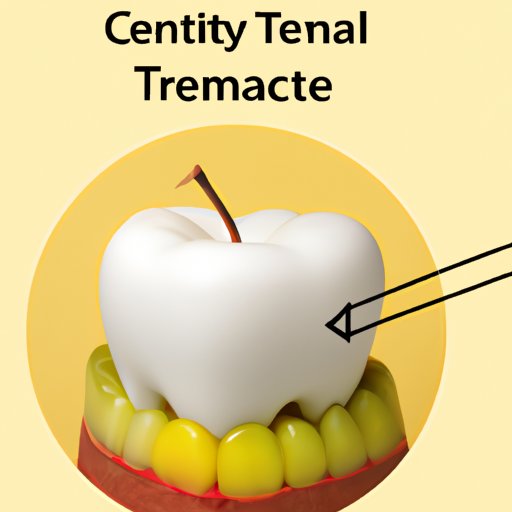
Introduction
A cavity is a common dental problem that can lead to pain, discomfort, and even tooth loss if left untreated. While prevention is always the best approach, it’s important to address cavities quickly and effectively to minimize damage to your teeth. In this comprehensive guide, we’ll cover everything you need to know about getting rid of a cavity, from natural remedies to standard dental treatments and budget-friendly options.
Natural Remedies for Treating Cavities: Try These At-Home Methods
Natural remedies can be effective for treating cavities, particularly in the early stages. Using natural methods is also a way to avoid exposure to chemicals and harsh dental treatments. Here are some of the best natural remedies for cavity treatment:
- Oil pulling: swishing a tablespoon of coconut oil in your mouth to help remove bacteria and reduce inflammation.
- Fluoride-free toothpaste: brushing with toothpaste that doesn’t contain fluoride can help protect your teeth without exposing you to potentially harmful chemicals.
- Consume foods high in calcium: eating more foods with calcium such as cheese, yogurt, and milk, can help strengthen your teeth and prevent cavities.
- Green tea: drinking green tea can help reduce inflammation and bacterial growth in the mouth.
Is It Possible to Get Rid of a Cavity Without a Dentist? Here’s What You Need to Know
While natural remedies can be effective, they may not always be enough to treat a cavity. In some cases, it is possible to treat a cavity at home, but it depends on the extent of the damage. Here’s what you need to know about treating cavities without a dentist:
If the cavity is small and hasn’t penetrated the enamel, you may be able to use natural remedies or over-the-counter products to treat it. However, if the cavity is larger or has reached the dentin layer, you will need to see a dentist. It’s also important to note that delaying treatment can lead to more serious dental problems, so it’s best to consult with a dentist as soon as possible.
Avoiding Fillings: How to Reverse Cavities with Diet Changes
Diet plays a significant role in cavity development, so making changes to your diet can help reverse cavities and protect your teeth from further damage. Here are some tips for incorporating cavity-fighting foods into your diet:
- Eat more cheese: cheese is high in calcium and helps neutralize acid in the mouth that can contribute to cavity formation.
- Consume leafy greens: greens like spinach and kale are high in calcium and folic acid, which promotes healthy teeth and gums.
- Xylitol gum: chewing gum made with xylitol helps stimulate saliva production, which neutralizes acid and reduces bacteria in the mouth.
- Limit sugary and acidic foods: sugary and acidic foods and drinks contribute to the development and progression of cavities, so it’s best to avoid them.
The Overall Guide to Cavity Treatment: Covering the Latest Options Available
If you have a cavity, there are several dental treatments available, from traditional fillings to newer options. Here’s an overview of the most common cavity treatments:
- Fillings: the traditional method of treating cavities by removing the damaged portion of the tooth and filling it with a dental filling material.
- Root canals: treatment for more extensive damage that involves removing the damaged pulp and nerve, and sealing the tooth.
- Ozone therapy: a minimally invasive alternative to traditional fillings that uses ozone to disinfect and heal the cavity.
- Remineralization techniques: a non-invasive approach that focuses on restoring minerals to the enamel and reversing early cavity damage.
The right cavity treatment for you will depend on the extent of the damage, your overall dental health, and personal preferences. Your dentist can help you choose the treatment that’s best for you.
The Do’s and Don’ts of Cavity Treatment: A Comprehensive Guide
To maintain good dental health and prevent cavities, there are some things you should do and avoid. Here are some tips:
- Brush twice a day with fluoride toothpaste: brushing your teeth twice a day and using toothpaste with fluoride helps remove bacteria and strengthen your teeth.
- Floss daily: flossing helps remove plaque and food particles from between your teeth, which can prevent cavities.
- Limit sugar consumption: sugary and acidic foods and drinks encourage bacterial growth and the formation of cavities.
- Chew sugar-free gum: chewing sugar-free gum after meals helps stimulate saliva production, which neutralizes acid and reduces bacteria.
- See your dentist regularly: regular dental checkups and cleanings can detect cavities early and prevent future dental problems.
Say Goodbye to Your Cavity: Effective Solutions That Don’t Break the Bank
Dental treatments can be expensive, but there are ways to find affordable care. Here are some tips for managing cavity treatment costs:
- Check with your insurance provider: dental insurance plans may cover some or all of the cost of cavity treatments.
- Research discounted dental plans: many organizations offer discounted dental plans for individuals who don’t have insurance.
- Visit a dental school: dental schools offer low-cost dental care by supervised students.
- Check with community clinics: some clinics provide low-cost or free dental care for uninsured individuals.
- Budget for dental expenses: include dental care in your monthly budget to avoid unexpected expenses.
Conclusion
Getting rid of a cavity is essential for maintaining good dental health. With the right care and treatment, you can prevent cavities from becoming a serious problem. Whether you choose natural remedies, standard dental treatments, or budget-friendly options, taking care of your teeth should always be a priority. Seek treatment as soon as you suspect you have a cavity to ensure the best possible outcome.





